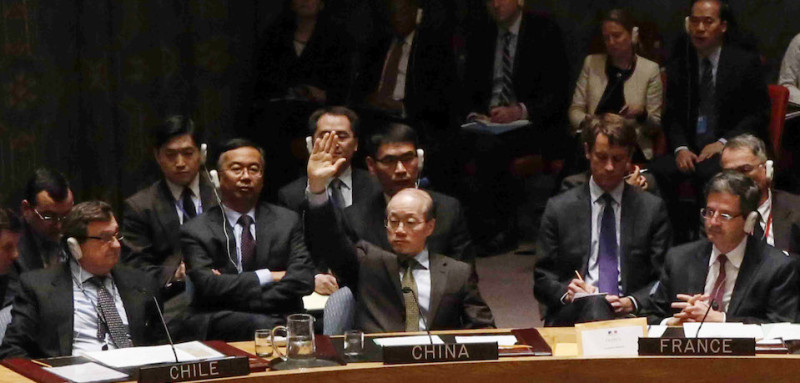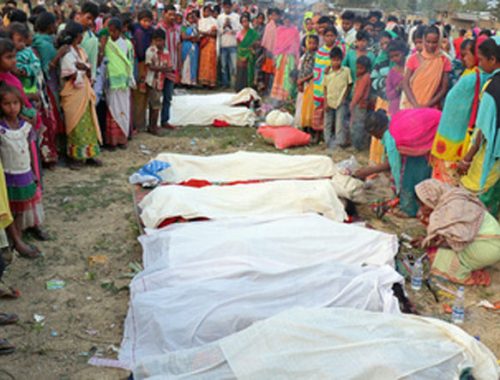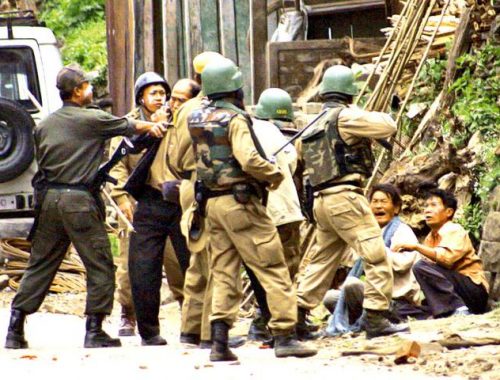- The proposal to designate Azhar under the 1267 Al Qaeda Sanctions Committee of UNSC was moved by France, UK and US on February 27
- Committee members had 10 working days to raise any objections to the proposal
- Just before the deadline was to expire, China put a “technical hold” on the proposal
China yet again put on hold aproposal at the UN for a ban on Jaish-e-Muhammed (JeM) chief Masood Azhar, bringing to a halt a renewed push by France, US and UK to blacklist the Pakistan-based terrorist after the Pulwama attack.
China has thrice earlier put the same proposal on a ‘technical hold’ before finally terminating the proposal. The hold can last up to a maximum of nine months, after which China can again use its veto power to formally block, or terminate, the proposal.
The Indian government said it was disappointed by the outcome. “This has prevented action by the international community to designate the leader of Jaish-e-Muhammed, a proscribed and active terrorist organization which has claimed responsibility for the terrorist attack in J&K on February 14, 2019,” it said in a statement.
“The ISIL (Da’esh) and al-Qaida sanctions committee (1267 Sanctions Committee), upon completion of the no-objection period on March 13, 2019, was not able to come to a decision on the proposal for listing Mohammed Masood Azhar Alvi under the UN Sanctions regime, on account of a member placing the proposal on hold,” it added.
The government said it was grateful for the efforts of the member states who moved the designation proposal. “We will continue to pursue all available avenues to ensure that terrorist leaders who are involved in heinous attacks on our citizens are brought to justice,” it said.
__________________________________________
It hardly matters that Masood Azhar has escaped once again
by Nirupama Subramanian
By the time you read this, Masood Azhar, the head of the Jaish-e-Mohammad (JeM), may have been listed under the United Nations Security Council resolution 1267 as a “global terrorist”. Or he may have escaped once again. Either way, it hardly matters. India loses too much sleep — and national energy — over 1267.
For sure, a listing will provide some satisfaction as a diplomatic victory. China had blocked Azhar’s listing over the years, and if it did not put up an objection this time, something has certainly changed. It will help India claim the shift as the result of the pressure brought to bear on Beijing in the days since the Pulwama attack and the India-Pakistan military standoff that followed. The NDA and BJP will use it as evidence of Prime Minister Narendra Modi’s diplomatic prowess. In the event he is not, India will rage, mainly through its media, against the country that prevented it.
But beyond that, 1267, adopted unanimously in October 1998, and strengthened through more than a dozen other resolutions passed over the two decades since, has proved remarkably ineffective in ending the support and safe havens that India-focussed terrorists and terrorist groups get in Pakistan. The al-Qaeda and Taliban Sanctions Committee set up to implement the resolution (now renamed The Daesh and Al Qaeda Sanctions Committee) updates its list of terrorists and terrorist entities every year. When the “consolidated list” of the Sanctions Committee was updated in February 2019, of the 262 individuals and 82 entities who figure in it, more than 100 are from Pakistan — either Pakistan nationals, or Pakistani passport holders, or non-Pakistanis resident in Pakistan, or groups with a Pakistan address.
In the list is India’s own most wanted, Dawood Ibrahim, with three addresses in Karachi; Ayman al Zawahiri, who took over as al Qaeda chief after Osama bin Laden was killed by the US forces; Harkat ul Mujahideen; Lashkar-e-Jhangvi; Tehreek-e-Taliban Pakistan; and of course, Hafiz Saeed, who entered the list in 2008, following the outrage over the Mumbai terror attack, and is named as leader of the Lashkar-e-Taiba (LeT) with a Lahore address.
Both the JeM and LeT have been in that list for nearly 20 years; the Jamat ud Dawa (JuD) since 2008, and JeM front groups such as Al Rasheed Trust from 2002 and Al Akhtar Trust International from 2005. The listing has made no difference to their activities in Pakistan, to carry out attacks in India, or their ability to spawn more proxies, such as Falah-i-Insaniyat Federation, a JuD front.
The 1267 regime requires states to freeze, without delay, the funds or financial assets or economic resources of designated individuals to prevent — the entry into or transit through their territories by designated individuals; the direct or indirect supply, sale and transfer from their territories or by their nationals outside their territories, or using their flag vessels or aircraft, of arms and related materiel of all types, spare parts, and technical advice, assistance, or training related to military activities, to designated individuals and entities. States are also required to pass laws in order to align themselves to 1267 requirements.
Explained: Model Code of Conduct
But the events that unfolded after Hafiz Saeed’s listing are instructive on how Pakistan has adjusted to 1267 when it comes to its “strategic assets”. Days after he was listed under 1267, Saeed was among the 125 persons detained under a preventive law called the Maintenance of the Public Order. He and five other top leaders were placed under house arrest. When the maximum three-month detention term ended in March 2009, a review board extended it. It was extended again in May 2009, but this time, Saeed challenged his detention in the Lahore High Court, pleading that; one, he had not been shown the grounds for his detention within 15 days as required by the law; two, Pakistan’s sovereignty had been violated and accusing the UN of “bias against Muslim countries”; three, alleging India and the US had conspired to put him in jail; and four, the UN listing did not require the individual to be arrested.
In ordering Saeed’s release, the three-judge bench said a “bald allegation (was) being levelled by the Indian lobby” that the JuD and Saeed had links to the Mumbai incident or to al Qaeda and the Taliban. The court declared there was no evidence that the petitioners are involved in anti-state activities and are a security risk. The judgment was described as evidence of the “independence” of the judiciary, which was fresh out of its battle with the then recently ousted military ruler, Pervez Musharraf.
Saeed has gone from strength to strength since then, starting a new group called Difa-e-Pakistan Council, comprising 40 or so like-minded groups, with the stated objective of protecting Pakistan from India and the US. Last year, the group held a meeting in which a Cabinet minister from the Imran Khan government participated. Saeed also has a political party to his name, that participated in the 2018 election.
The JeM’s relationship with the Pakistan state has been more complicated than with the JuD and Saeed, but judging by the resources the security establishment has thrown into protecting Azhar and building up the group, it appears no less solid. A 1267 listing of Azhar would not change anything, unless Pakistan itself changes in fundamental ways to stop using these groups as instruments towards achieving its strategic objectives in India or Afghanistan. Every time the world’s attention has focussed on Pakistan for terrorism emanating from its soil, it has rushed to take so many steps against these groups that they should have disappeared by now. The groups have been banned under Pakistan’s own laws, their leaders and cadres detained, their funds frozen. Twice during his time as the military ruler of Pakistan, Pervez Musharraf denounced these groups as terrorists, and said Pakistan would not give them room anymore. But these steps have always proved to be cosmetic. That is why no one believes the latest arrests will lead to any real changes, at least in the foreseeable future. Pakistan is not yet ready to make any of the structural changes that would really matter.
That means irrespective of the outcome at the UNSC, India would be better served ensuring that such groups get no opportunity to find their way across into the country in the first place. That not only means securing our borders better, it means putting our own house in order. Not long ago, to Sri Lanka’s accusation that the LTTE was India’s creation, India would lecture Colombo on a political resolution to Tamil rights. That was not far wrong. Same here. It would require much introspection into what has gone so horribly wrong in Kashmir that the JeM, and LeT and Hizbul Mujahideen have all been able to make a comeback in Kashmir today. Unless we fix what’s so broken in Kashmir, global lists of terrorists will be just that — lists.
This article first appeared in the print edition on March 14, 2019, with the title ‘Beyond Masood Azhar’. Write to the columnist at nirupama.subramanian@expressindia.com.




